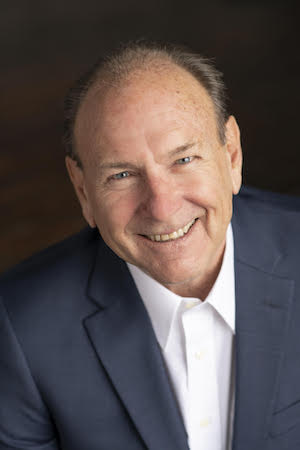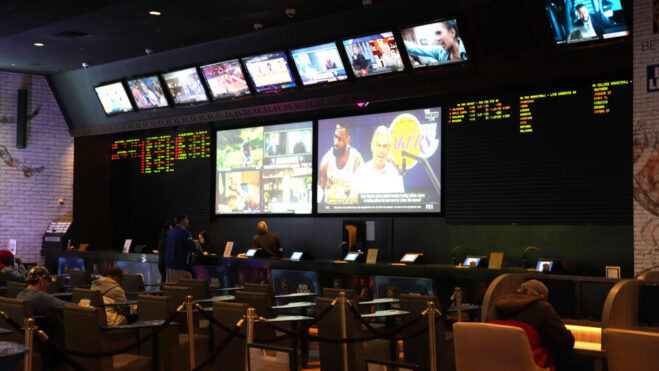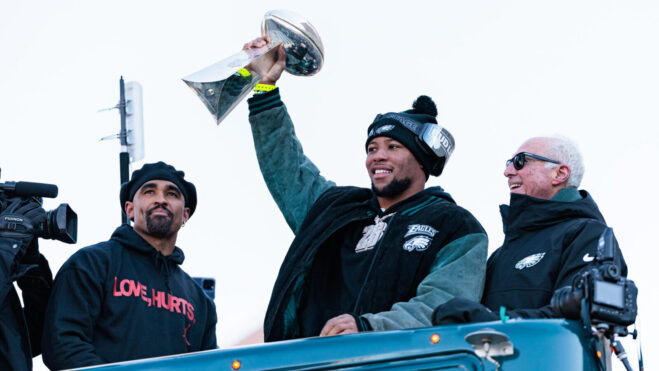Schuetz: The Unrelenting Challenge Of Being A Real Bookmaker
The sports betting and information markets slow down for nobody at all
9 min

Too much work, and no vacation,
– Oscar Wilde
Deserves at least a small libation.
So hail my friends, and raise your glasses,
Work’s the curse of the drinking classes.
Real bookmaking takes a lot of time. The sports calendar eats up weekends and holidays. It is a day job and a night job, and since sports navigates across many time zones, the workday starts early and ends late. Then there is the phone …
Back in the day, Scott Schettler ran the book at the Stardust, and Scott reported to me, at least on paper. I can assure you I learned much more from Scott than he ever learned from me, so while I was his boss, I was also his student. The Stardust arguably had the largest legal book in the U.S. for many years.

I entered Scott’s office one day, and he was obviously not feeling well. I suggested that he get to a doctor, for one thing I knew about Scott was that he was a tough guy and would play through the pain — even when it was the wrong decision. He said he could not leave the office because too much was going on.
Several hours later, I returned to his office to see how he was feeling. He was sitting there with his doctor, having just gotten a shot in the butt for whatever ailed him. His doctor bet with our book, and Scott suggested he come down to make his plays and give Scott something that would make him feel better. His doctor did.
Hey, this was Vegas, baby.
Such was the nature of being a bookie — back in the day.
Man versus machine
There has been a fundamental shift in the booking business, primarily related to the internet. What is significant about the internet is that it is a vacuum for data.
An equally important shift is in some operators’ attitudes and relationship with risk. Back in the day, the big and respected operators worked to manage risk, whereas generally, today, the effort seems to be to avoid risk.
When I was involved in the booking business, we did not necessarily know our customers. Sure, we had Stinky, Cowboy Bob, Jimmy the Jew, Tommy Two Fingers, and the rest of the crowd — folks like that. Frequently, however, someone would walk up to the counter, someone we had never seen before, and ask what our limits were. And he wanted to know what our limits were because he was packing a serious bankroll.
In that day and age, being unable to answer that question would have made a booking operation look like complete fools. We would answer the question or hand him a sheet that listed our limits. We would also mention that we were willing to visit on the topic if he seemed serious. We did not know the person’s name or anything else. He would then hand us a bunch of cash, and we would give him a receipt memorializing the bet.
The critical part of the above was the question about limits. If the answer was a small number, you lost the top end of the market and became a recreational book. A recreational book would copy other operators’ numbers, have small limits, and grind along. They also did not need to hire the sharpest management on the planet, for it was a reasonably low-risk, low-rent, and low-skill operation.
However, if the limit number was going to be big and the desire was to be branded as a top-quality book, acquiring top-drawer talent could be challenging and expensive. Having very good people to manage lines and prices is essential in this type of operation. You needed intelligent people who could read people and make sound decisions. They also could not be afraid of risk.
In today’s betting world, many operators feel that the bet limit is specific to the player. If the player is an intelligent and skilled bettor, the operators can ban or limit the player’s action. If the player’s history indicates he is something of a dull-normal who tends to lose, they can up his limits and bonus him like crazy. This model does not take good bookmakers but people who are good with computer code. They are easier to acquire than quality bookmakers.
The point is that what passes for many betting operations today is more of a data shop where the algorithms spot the sharps and limit or ban them. They also identify the dunces in the mix and encourage them to fire it up. In other words, the sharps are shown the door or limited, and the losers become targets of aggressive marketing. The bigger the loser, the more boisterous the marketing effort to keep this player in action.
Something else entirely
What is curious about this is that numerous states subsidize free bets through tax breaks, which implies that they are subsidizing a process that may now be used to exploit problem gamblers. Will the newly established Responsible Online Gaming Association, funded by the operators, work to eliminate this tax break that primarily subsidizes promotions aimed at bettors who are losing? (Okay, I always like to throw in some humor in my articles.)
I have no idea what the legislators thought they were getting when they legalized modern sports betting, but I sense that it is not what they got. But then, who knows? Many of them got sizeable contributions from the industry, or jobs.
Maybe in the future, the regulators will insist that the operators declare their political contributions and lobbying expenses on the regulator’s websites so that the public and the bettors can understand the role of industry money in shaping gaming policy. (More humor.)
My attitude is that what is happening today in the so-called online sports betting world, compared to real sports betting, is like comparing a carnival caricature artist to Monet. The bookmaking profession has fundamentally changed to the point that what is happening now should be called something else. It is now in the area of entertainment or amusements and is designed and marketed to attract the young and/or dumb.
So, if you will excuse me, allow me to talk about a few actual bookmakers.
Nick, Vinny, and Joe
I started thinking about writing this article when I attended the Sports Gambling Hall of Fame dinner at the Circa Hotel & Casino in Las Vegas this year. Nick Bogdanovich and nine others were being inducted into the Sports Gambling Hall of Fame at a black-tie event in the Circa Resort & Casino Ball Room, which over 500 people attended. As an aside, Circa operates a real book.
Nick is one of those strange beings who was actually born in Las Vegas. He has been a bookmaker since the 1980s. Two realities of Nick’s life are that he has booked to high limits throughout his career, and he is incredibly well respected by the bookmaking industry and the bettors.
What captured my attention as Nick spoke as he accepted his award was his discussion of the commitment a bookmaker needs to make to run a real book and what that can mean to both the bookmaker and the bookmaker’s family.
Because of the substantial audience available on television in the U.S. during holidays, sports events generally are found to be on the viewing schedule. If you are a bookmaker and want to be with your family on Thanksgiving, Christmas, New Year’s, and the like, you need to find another occupation. Those are active sports days and, therefore, active betting days. Then there are the Monday night events, the Thursday game, and the weekends. And, as the sports betting menu circles the globe, there is seldom a quitting time.
Nick, in his speech, made the point that a strong, forgiving, and supportive better half is critically essential for a bookmaker. During this time, I sensed that the emotion behind Nick’s comments about his family was getting to him.
Before I wrote this, I wanted to have a follow-up conversation with Nick, and, true to the life of a bookmaker, it was hard to find time. We finally arranged a call while he was driving home from work.
In that conversation, he talked again about the importance of his family in being strong, forgiving, and supportive. He also spoke about how it wasn’t easy, at times, to switch between the different components of his reality, especially in today’s world of being continuously connected to the internet. He could no longer leave the office, for the office was in his pocket.
One of the recent news stories of interest in the sports community was Adrian Wojnarowski leaving ESPN on short notice. The issue was the 24/7 nature of his job and the role of burnout. I asked Nick if he could relate.
Nick said he was a bookmaker, and, as Billy Baxter explained to him early on, bookmaking is a seven-days-a-week, 24-hour job. He said he still felt the rush and excitement of it all and would continue to do it until that stopped.
He finished our discussion by again mentioning the importance of his family’s support. The reader may notice a trend.
Vinny Magliulo has been involved in the gaming business for over 45 years. He really became materially noticed by the betting world in the 1980s when he worked with Richie Baccellieri (a.k.a. Stevie the Pencil) at Caesars Palace. Since then, his bio has continued to impress. He is now a fixture at South Point Casino in Las Vegas, and that book is known to punch well above its weight.
When I visited with Vinny, I asked him about the 24-hour, seven-days-a-week nature of the real bookmaking profession, and he immediately disagreed. He suggested that, from his experience, it was more like a 25-hour, eight-day-a-week business.
When Vinny was with Caesars, he made the point that during certain times of the year, he would not leave the property but take a room in the hotel section of the facility to catch cat naps. And when he did leave the property, he was attached to different technological leashes as they evolved. These would be simple beepers that later offered the ability to add messaging and voice functions — and finally, to the ultimate leash, the smartphone.
Vinny mentions being beeped at a christening when he forgot to mute his leash with the most audible message of “Call the Sportsbook.” The Catholic priest later caught up with him and commented that he would pray for a Notre Dame win. He also found himself in other embarrassing, unmuted instances, such as parent-teacher conferences.
In visiting with Vinny, he suggested that one of the most important lessons he learned as he progressed was the importance of teaching and training those around him so that they could tackle a portion of the load, thus allowing him to get away from the property. He also emphasized the importance of crafting sound policies and procedures for his colleagues, especially in an industry where errors can be very costly.
Vinny echoes Nick in discussing the importance of an understanding and supportive family. He notes that his spouse makes the point that there is always a season when it comes to a bookmaker. It is just the shape of the ball that changes.
Anyone who has had the opportunity to get to know Vinny clearly understands that he loves his involvement in the business.
Joe Brennan, Jr. is the executive chairman of Prime Sports. Joe was a strong and active advocate for legalized sports betting in the United States and was actively engaged in securing the overturning of PASPA in 2018.
Joe also became involved in betting at a very young age — probably too early — but, hey, you learn what you learn.
While Joe is currently an operator in the online sports betting market, he is something of an old soul who offers a product that accepts large wagers and does not limit or ban winning bettors. He purposely set out to create an American betting product rather than rely on copying the models from across the pond. This means he is developing (not copying) lines and managing line moves and pricing. In my language, he is an American-style bookmaker delivering his product online.
Given the delivery system of Joe’s product, he does not operate out of the book’s office, per se, but is always connected to his business via technology. And, as Scott, Nick, and Vinny have indicated, a person in the real booking business is always on.
Joe has a most interesting way of explaining this: No matter where he is, he is not always there, for the business demands an incredible amount of attention. A real book does not fly by autopilot but rather by active engagement, and Joe needs to be prepared for that active engagement 24/7.
He, too, suggests that he is blessed with a strongly supportive family, although he does note an occasional disapproving glance from his bride. Imagine that.
Joe also has to contend with the notion that because he is dealing with higher limits and more sophisticated bettors, they often want to visit with him directly. During a recent 20-minute phone call I had with Joe, three different players pinged him. Combined with X (Twitter) and other social media, he often feels like the call center. Still, he clearly understands the importance of filling that role with his reasonably unique product, for in the old-school way, the customer is king — not a consumable.
And why does Joe do this?
Like the others, he loves it.
—
Richard Schuetz entered the gaming industry working nights as a blackjack and dice dealer while attending college and has since served in many capacities within the industry, including operations, finance, and marketing. He has held senior executive positions up to and including CEO in jurisdictions across the United States, including the gaming markets of Las Vegas, Atlantic City, Reno/Tahoe, Laughlin, Minnesota, Mississippi, and Louisiana. In addition, he has consulted and taught around the globe and served as a member of the California Gambling Control Commission and executive director of the Bermuda Casino Gaming Commission. He also publishes extensively on gaming, gaming regulation, diversity, and gaming history. Schuetz is the CEO American Bettors’ Voice, a non-profit organization dedicated to giving sports bettors a seat at the table.






